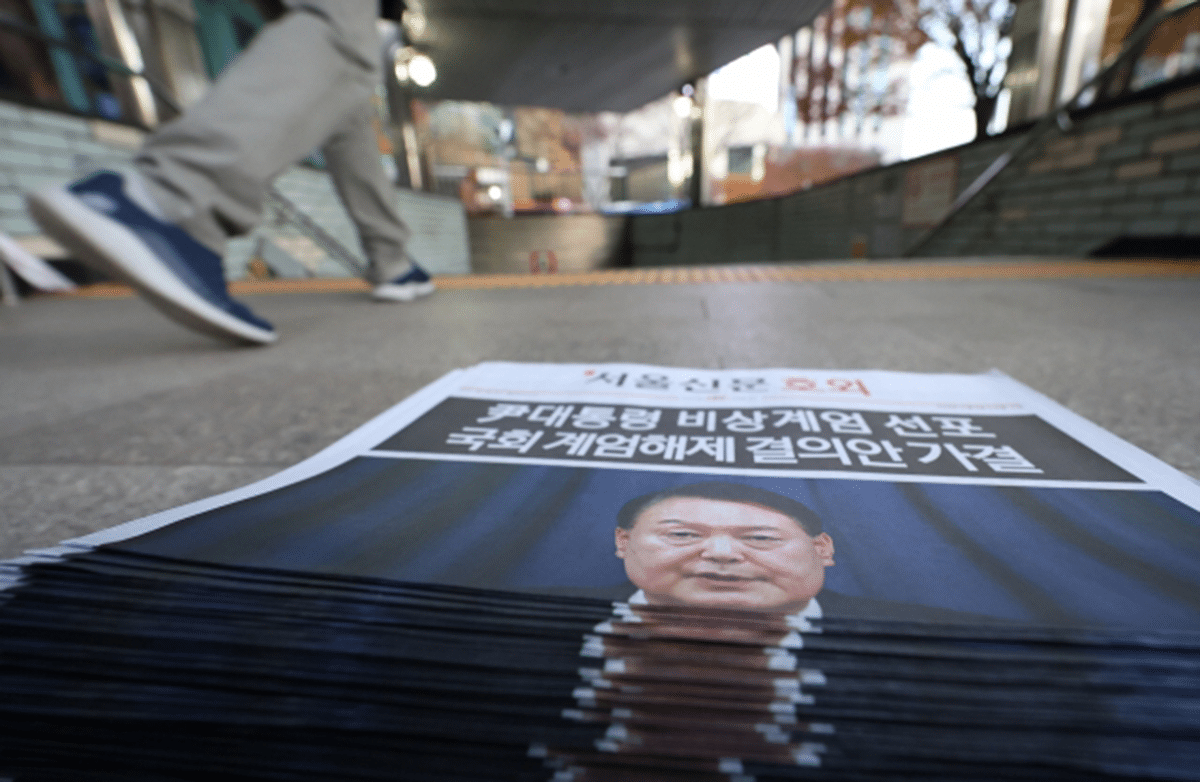
A special edition extra newspaper covering President Yoon Suk Yeol’s public address and announcement lifting martial law is displayed near Jonggak Station in central Seoul on Wednesday morning. (Yonhap via The Korea Herald/Asia News Network)
SEOUL — Foreign missions in South Korea have swiftly reacted to President Yoon Suk Yeol’s announcement lifting the emergency martial law declaration, advising their citizens to remain cautious and avoid participating in mass rallies as developments surrounding the situation continue to unfold.
Only a few countries, including the United States, the United Kingdom and Japan, have issued official government responses to Yoon’s declaration of martial law, delivered during a late-night televised address on Tuesday, maintaining a cautious stance as of Wednesday afternoon.
The US Embassy in Seoul issued an alert on Wednesday, stating that the “situation remains fluid” despite Yoon’s withdrawal of martial law. The embassy also announced the cancellation of routine consular appointments for US citizens and visa applicants.
READ: No need to cancel S. Korea trips but Filipinos must be cautious – DFA
“US citizens should anticipate potential disruptions. When in public, you should pay attention to your surroundings and exercise routine safety precautions,” the alert stated.
“You should avoid areas where demonstrations are taking place and exercise caution in the vicinity of any large crowds, gatherings, protests, or rallies. Even demonstrations intended to be peaceful can turn confrontational and escalate into violence.”
US Secretary of State Antony Blinken stated on Tuesday, local time, that the US welcomed Yoon’s decision to rescind the emergency martial law order.
“We continue to expect political disagreements to be resolved peacefully and in accordance with the rule of law,” Blinken said.
READ: What we know about South Korea’s martial law
The UK government on Tuesday expressed concern over the recent developments. “The United Kingdom is deeply concerned by the events in South Korea on the 3rd of December,” said Catherine West, Minister for the Indo-Pacific, in a statement.
“Our Embassy in Seoul continues to monitor developments and is in touch with the Korean authorities. We call for a peaceful resolution to the situation, in accordance with the law and the constitution of the Republic of Korea.”
British nationals in South Korea were advised to follow Foreign, Commonwealth & Development Office travel advice and remain alert.
The Japanese Embassy in Seoul has sent multiple emails to Japanese citizens in South Korea, urging them to “continue to monitor the news and ensure their safety.”
Japanese Prime Minister Shigeru Ishiba on Wednesday said Tokyo was monitoring the situation with “exceptional and serious concerns,” while pledging to “take all possible measures” to ensure the safety of Japanese nationals.
However, Ishiba refrained from commenting further on South Korea’s domestic politics, stating, “I am not in a position to comment on the internal affairs of another country.”
The Australian Embassy described the situation in South Korea as “evolving due to developments in domestic politics” and urged its citizens to avoid protests and demonstrations.
“Transport and other essential services may be disrupted. Monitor the media for updates and follow the advice of local authorities,” the embassy advised.
The Russian Embassy advised its citizens to “remain calm, follow the authorities’ recommendations, and refrain from participating in mass events, especially those of a political nature.”
Meanwhile, the Chinese Embassy assessed that “at present, social order in South Korea is normal.”
“Chinese citizens in South Korea may return to their daily lives but are advised to remain vigilant, stay informed about the local situation, and enhance personal safety precautions,” the embassy said.

